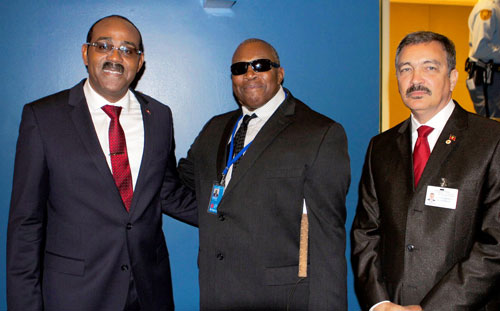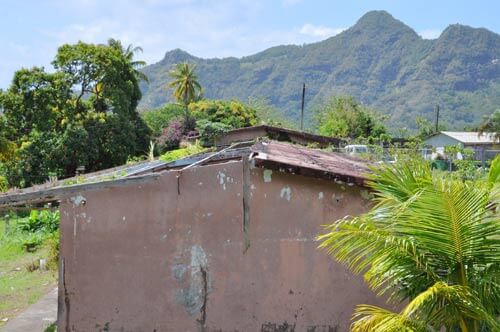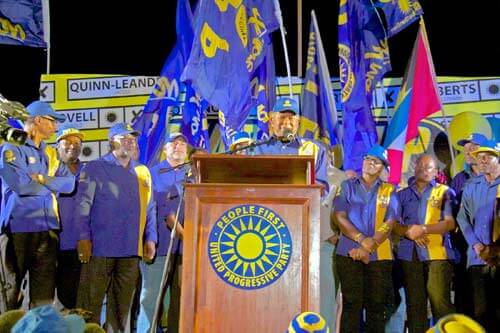Antigua
The government of Antigua and Barbuda recently partnered with Bright Path Foundation, a non-profit organization specializing in technology training, to host a mobile app development workshop at the new Government Assisted Technology Endeavour (Gate) ICT Cadet Training Facility in St. John’s.
The workshop, which took place from Oct. 8 to 18 was supported by Columbus Communications, Digicel and Lime, and coordinated by BrightPath Foundation.
Speaking at the opening ceremony for the workshop, Antiguan Telecommunications Minister Dr. Edmund Mansoor said: “I am pleased to have BrightPath, the region’s leading provider of mobile app and digital content training to Antigua for this historic workshop.”
The two-week workshop, which was oversubscribed just two days after it was announced, was designed to provide participants with the ability to design, build and market mobile apps.
Barbados
The London-based Walk Free Foundation has listed Haiti as the second country, globally, engaged in modern-day slavery.
The Global Slavery Index 2013 is defined by the Walk Free Foundation as the “possession or control of a person negating their freedom and exploiting them for sex or as a commodity.”
It ranked 162 countries by estimating the number of people in each nation affected by a range of practices, including forced and bonded labor, human trafficking, forced marriages, and the use of children in the military.
According to the report, India has the highest number overall, with 13.96 million people estimated to be living in slavery, almost half the global total.
Apart from Haiti, the other Caribbean Community (CARICOM) countries listed on the global index on modern slavery are Suriname at 68 and Guyana 77th.
The index includes servitude, forced marriage and the kidnap of children to participate in conflict.
The lead researcher on the project, Kevin Bale, said he hope the annual report would “elevate awareness of the situation of slavery to a world level, as the statistics presented in the document represent an all-time high.”
According to the report, Haiti has an estimated around 220,000 people living in such conditions, the average of which represents just over two per cent of its 10.2 million population.
Guyana
The Organization of American States (OAS) is keeping a close watch on a diplomatic row between Guyana and Venezuela from the detention of a research vessel in Atlantic waters claimed by both countries as their maritime territory. “The OAS is following the developments very closely and is awaiting the results of the meeting of the Foreign Affairs ministers of the two countries,” said Assistant Secretary General of the OAS, Albert Ramdin.
He said so far none of the involved parties both member states of the OAS-have approached the organization in an effort to resolve the matter.
“This issue has not been brought to the attention of the Permanent Council. As long as there is official request or presentation within the OAS by one of the involved countries, the general secretariat will take no action as such,” Ramdin noted.
Recently, Venezuela’s navy seized and detained the Teknik Perdana, a research vessel that was surveying for oil in the Roraima Block off-shore Guyana, prompting Georgetown to immediately demand its release.
Haiti
An anti-government protest march in Haiti’s capital has ended in tear gas and flaming barricades.
Thousands of people joined the recent protest, marching through the streets of Port-au-Prince to complain mainly about the higher cost of living.
It was one of the biggest demonstrations against the administration of President Michel Martelly this year.
The crowd consisted of supporters of former President Jean-Bertrand Aristide and opposition lawmakers.
The march began peacefully but ended as protesters approached the presidential grounds.
Police fired warning shots and tear gas canisters and a small group of protesters set fire to barricades made of tires. The protest happened on a national holiday known as Jean- Jacques Dessalines day, honoring one of the nation’s founding fathers.
St. Lucia
Manufacturers in St. Lucia have urged the government to re-examine issues related to the Value Added Tax (VAT) that was introduced one year ago.
The manufacturers state that with empirical data and stakeholder feedback now available, the government is in a position to make the necessary revisions to help deliver stability, jobs and economic growth.
President of the St. Lucia Manufacturers Association (SMA) Paula Calderon says that one year after implementation of VAT, her members continue to be plagued by policy and implementation issues that threaten their very survival.
She laments that the requirement to pay VAT upfront on imported raw and packaging materials, plant, tools, equipment and other supplies has adversely impacted the cash flow of many SMA members.
The SMA claims that with diminished cash flow, businesses are finding it difficult to meet their commitments, resulting in disrupted operations that impact both staff and consumers.
St. Vincent
St. Vincent and the Grenadines’ Prime Minister Dr. Ralph Gonsalves has concluded what has been described as “a successful visit” to Washington.
According to a statement from the St. Vincent and the Grenadines Embassy, Gonsalves, “elaborated many of the foreign policies of his government to U.S. lawmakers, the executive management of the Organization of American States (OAS), foreign diplomats, U.S. and Caribbean media, American civil society and the Vincentian Diaspora.
The statement pointed out that the main highlight of the prime minister’s visit was to deliver the keynote address at the opening of a symposium hosted by the Washington-based Institute of the Black World 21st Century (IBW).
The symposium was also attended by former prime minister and president of Cape Verde Pedro Pires. Both leaders received legacy awards for their distinguished service in fostering Pan-Africanism. In addressing the theme of the symposium, “The Future of Democracy and Development in Africa and the Caribbean,” Gonsalves “delivered a masterful discourse on the productive capacity of African nations and the use of its resources,” the statement said.
Trinidad
The Opposition People’s National Movement (PNM) bounced back after an overwhelming defeat in the 2010 Local Government Elections to take nine of the 14 Corporations, including the four Boroughs – Port of Spain, Arima, San Fernando and Point Fortin.
The PNM had held three of the Corporations in the last election three years ago and the United National Congress (UNC) and the Congress of the People (COP) controlled 11.
The People’s Partnership (PP) led by Prime Minister Kamla Persad-Bissessar this time around managed to hold on to just five of the Corporations in the UNC “heartland.” The other major partners in the coalition government, the Congress of the People (COP), which had controlled two of the Boroughs managed to hold on to two seats in the San Fernando Borough Corporation and one in the regional corporation.
This is the third defeat for the PP in three elections this year. On Nov. 4, 2013 people in the St. Joseph constituency, about four miles from the city of Port of Spain, will go to the polls to elect a member of Parliament in a by-election.
The United National Congress (UNC) MP former High Court Judge Herby Volney recently resigned from Parliament paving the way for the by-election.
The newly formed Independent Labor Party (ILP) led by MP Jack Warner was able to win three seats – two in his stomping ground – the Chaguanas Borough Corporation.
The election was fought under a new Proportional Representation system, which was rushed through to Parliament a week before.
Under the PR system a party which gets the highest votes will get four Aldermen, while a party, which collects 25 percent of the votes would be entitled between 1- 2 Aldermen.
Prime Minister Kamla Persad-Bissessar while not admitting that it was a defeat for her PP government, said it is not the parties which won but it was a people’s victory.
Antigua
Antigua and Barbuda’s Parliament has finally passed their controversial Citizenship-by-Investment Program (CIP) Bill.
Prime Minister, Baldwin Spencer has hailed the program a savior to the economy.
“The singular goal of the Antigua and Barbuda Citizenship by Investment Program is to generate investments and jobs for Antiguans and Barbudans and to put Antigua and Barbuda on the road to sustainable growth and development,” Spencer said.
Antigua and Barbuda joins the ranks of only two other Caribbean countries that sell its citizenship through investment – Dominica and St. Kitts and Nevis. The latter has the longest running Citizenship-by-Investment Program.
Modeling its CIP after that of St. Kitts and Nevis, investors applying for Antiguan citizenship by investment are required to make a US$250 000 contribution to the country’s National Development Fund or make a US$400 000 real estate investment in approved developments.
St. Kitts and Nevis recently suspended its Citizenship-by-Investment Program to citizens of Iran and Afghanistan. No specific reasons were given for the suspension of the two countries but a statement from the Office of the Prime Minister said that the program was under review to ensure that its integrity is maintained.
Guyana
Canadian company is getting ready to launch, what has been touted as, the largest private mining investment for the South American country of Guyana. Toronto-based Guyana Goldfields Inc. said recently that the Aurora Gold Project will cost some $205 million and is expected to produce some 3.3 million ounces (94 million grams) of gold as part of a 20 year deal.
The company says it is buying heavy-duty equipment and will soon build permanent housing at the mining site in western Guyana. Actual mining is slated to begin in early 2015. Gold is Guyana’s leading export. Local miners produced more than 400,000 ounces (11.3 million grams) of gold last year and are anticipating producing 465,000 ounces (13 million grams) this year.
Compiled by Azad Ali


























